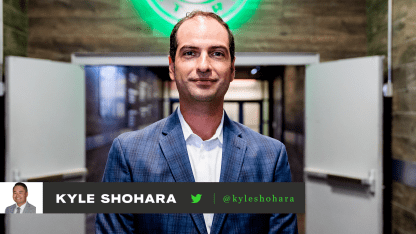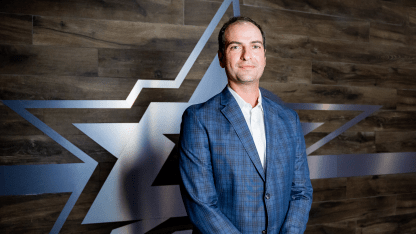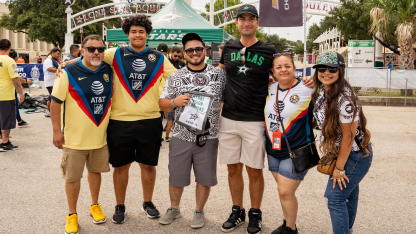FRISCO, Texas -- Standing underneath a glowing neon Dallas Stars sign at the team's corporate headquarters in Frisco, Texas, Al Montoya was beaming.
A big, bright smile flashed across the former NHL goaltender's face as he took in his new surroundings. Minutes earlier, he was reunited with a former teammate from his playing days - the kind of unexpected encounter with someone from yesteryear that immediately floods your mind with nostalgia.
Opening new doors: Al Montoya, Stars share commitment to inclusion
As Dallas' director of community outreach, the former NHL goalie wants to be a voice for underrepresented fans and help grow the game of hockey

It was Stars defenseman Alex Petrovic, a new face to the roster this season but one that Montoya knows well. The two were teammates with the Florida Panthers from 2014-16 but haven't seen much of each other since. The embrace was strong.
"How the heck are you doing, dude?" Petrovic said, having just finished an informal skate with his new teammates at the Stars' practice facility adjacent to the corporate office. "What are you doing here?"
"I'm working for the Dallas Stars now," Montoya said proudly. "It's incredible. This is home now."
This is home.
Montoya is here because he wants to make a difference with the Stars. As the organization's newly-named director of community outreach - a position created specifically for Montoya - the 36-year-old Chicago native wants to be a voice for underrepresented fans and help grow the game of hockey, especially among Spanish-speakers like himself. After retiring from the game in 2019, he wondered if there was an opportunity to bridge the gap between his two passions: hockey and the Hispanic community.
He struck up a friendship with NHL deputy commissioner Bill Daly and senior executive vice president Kim Davis on using his platform - the first Cuban American to play in the NHL - to grow the game of hockey at a grassroots level in Hispanic communities.
Daly and Davis had his full support.
"I got great advice from them," Montoya said. "They've been great mentors. I spent the past two years surveying teams to find out what they were doing in the community and how they were trying to grow the game, specifically in the Hispanic community. The Stars were at the top of the list to begin with."
As he continued with his research, Montoya noticed a trend. The Stars kept appearing at or near the top of the list when it came to community investment, from volunteer opportunities and outreach programs to youth hockey and learn to play initiatives.
Heading up the community side of the Stars is Foundation president Marty Turco.
"When I started this research two years ago, Marty was one of the first people that reached out to me as an advocate and how Dallas could be a good place," Montoya said. "I didn't go to the University of Michigan at the same time as him, but he was my role model and someone I looked up to. He saw this as a no-brainer.
"As we went further along, it was a connection he made with me and Stars president and CEO Brad Alberts, as well as with my agent, Kurt Overhardt. Next thing I know I'm getting a call from Brad about the difference we can make together being here in Dallas."

Making the game accessible to everyone is extremely important to Alberts, who oversees all aspects of the Stars' business operations. Under his watch, the Stars operate eight Children's Health StarCenters across the Metroplex, which feature free youth and adult learn-to-play programs. Recently it was announced that the Stars had the highest percentage of girls participating in NHL Learn to Play programs at 47.10 percent, while the national average was almost 20 percent.
But still the question remained: How can the Stars connect with the Hispanic and Latino population in Dallas, which, according to the U.S. Census Bureau, is
hovering near 42 percent
. And on a more macro level, how can the organization positively impact people of color around the world?
It starts with a desire to do so.
"It's very important," Alberts said. "Dallas is a very large, culturally diverse city. We want the Stars fanbase to represent the city. We want to be Mexico's team. We want all groups to feel comfortable at a hockey game. We want young girls and boys aspiring to play hockey."
Alberts says it became clear early on that Montoya would be the perfect person to lead the organization's Hispanic initiatives.
"I knew he would be a great fit with us immediately," Alberts said. "He was passionate and ready to move into the next phase of his life. We're extremely committed to developing Hispanic business relationships, both corporately and individually.
"Al's ability to attract people from all underrepresented groups into our youth hockey programs will be extremely important. We want them to feel comfortable at our rinks and allow them to fall in love with the sport like so many others."
To have someone like Alberts in his corner means everything to Montoya.
"That was huge," he said. "I didn't want to check a box. I wanted to make a difference and get to work right away. To have an opportunity to go somewhere, as a minority, to come in and know there's room for growth. After speaking with Brad and [Stars general manager] Jim Nill, I got the sense they were doing it not just because it was good business sense, but also because it's the right thing to do. They understand diverse minds are points of strength.
"It was them being progressive, being leaders and wanting to make a difference and not just checking a box. That was a big thing for me in my post-hockey career. It was about making a measurable difference, and I think the opportunity in Dallas is a big one."
¡Bienvenido a los Dallas Stars, Álvaro Silva Montoya! pic.twitter.com/4rAwTVDuZx
— Dallas Stars (@DallasStars) September 9, 2021
More and more we're seeing people of color getting involved in the sport of hockey. Though times are changing, slowly, Montoya wants to use his life experiences and time in professional hockey to introduce the game to everyone.
"As cliché as it sounds, I didn't have people that looked like me, that sounded like me, in the front office or on the ice," he said. "Now we have more Hispanic and Latino players in the league, but still not many in the front office. It's good for kids and young people to see people in the front office knowing there's room here. Those diverse minds lead to an even greater game. They lead to a better office space. If you see it, you can be it. It sounds simple, but it goes a long way."
Moving from city to city is nothing new for Montoya. Over nine NHL seasons, Montoya suited up for the Phoenix Coyotes, New York Islanders, Winnipeg Jets, Florida Panthers, Montreal Canadiens and Edmonton Oilers. He also spent time in the American Hockey League with Hartford, San Antonio and Bakersfield, but this move was much different. He didn't have a say in where he went as a player, but now in his post-playing career, as a husband to wife, Annie, and his three children, daughter Camila (8), and sons Henry (6) and Nicolas (2), the decision to pack up and move the family from Chicago affected everyone.
"I could've been comfortable taking a job in Chicago and been fine with it, but it's not what I would've wanted to do," Montoya said. "It's not what I set out to do. In those two years talking to teams, I could basically write a book on what executives said to me. It was needing to take that leap of faith to get out and move to Texas. That was the hardest part, to pack up after I retired.
"Not many guys make the move. Most guys when they retire, they stay at home, and that's fantastic. That's awesome. But I built up all this momentum on what I was wanting to do, and now the opportunity finally presented itself. What pushed me over the top was the encouragement and appreciation that came from my wife. Without her, I wouldn't be here."
Montoya is all about family. His mother, Dr. Irene Silva, emigrated from her native Cuba in 1963 with her parents and siblings, and raised Montoya and his three brothers by herself. He still calls her daily.
"I was raised by my mother, and my ultimate goals were to make sure I gave back to all those that gave to me," he said. "My wife and my mom were my biggest advocates to take this leap, to come down here and work for this team. That made the decision much easier.
"When the going gets tough, I really take myself back to what my ancestors went through, whether it was my great grandfather in a concentration camp or my grandparents and my mother fleeing 1963 Cuba and leaving that country and everything they knew behind for freedom in the United States. I consider this transition another part of my life."
One of Montoya's first assignments in his role with the Stars was to be a welcoming presence at the El Súper Clásico soccer match between rival clubs Club América and Chivas Guadalajara at Cotton Bowl Stadium on Sept. 5. The Stars set up a pop-up tent full of giveaway items, including preseason tickets, and an inflatable slapshot cage.
Among the displays at the booth was a biography of Montoya's playing career written in Spanish. Despite the unbearable heat and humidity, Montoya spoke with hundreds of soccer fans - and
might've even made new hockey fans
in the process.

"I felt like I was home," he said. "I felt a sense of family and the understanding of the culture. It was something I grew up with. Their willingness to want to celebrate and show their excitement to see one of their own in the game. I can't say that enough. To be able to see that, have one of those kids see that and look up to you, it was something I didn't have as a kid. I know it'll go a long way."
Montoya's message to the fans at the match was this: We're going to go where you feel comfortable. This is our opportunity to say we're coming to you. Hockey might not be part of your life now, but give us the chance to win you over. That could be us coming to your functions or your sporting events. It's something we're going to consistently do and continue to send this message that hockey is for everyone.
Many of those he talked to had never been to a hockey game or shot a puck with a hockey stick.
"It's about opening the doors and showing there's opportunity here when maybe there wasn't opportunity before," Montoya said. "Everyone deserves a chance with this beautiful game. This game that, in our opinion, is the best on earth. It's something we want to be consistent at and continually do. The more fans we get, the better.
"Our goal is to be present in the community, continue to grow the game and open the doors to give kids and adults the opportunity that we've had to enjoy this game," he added. "The more we can do that, the more we can be present, that's my job and I want to be consistent."
Montoya knows change won't happen overnight. Challenges, big and small, certainly lie ahead. But change won't happen until you make it.
"For better or worse, the biggest and most important thing is we're doing it now," he said. "We're here today making a difference. We're going to be consistently making a difference. That's what I'm here for.
"My passion for the game, the culture, I don't feel like I'm ever working when I'm talking about growing the game of hockey within underrepresented communities. It's a love for the sport - a sport that gave me so much. Let me give back to it. How best can I do that? Being here with the Dallas Stars."
This story was not subject to the approval of the National Hockey League or Dallas Stars Hockey Club.
Kyle Shohara is the Digital Manager for DallasStars.com and writes about the Stars/NHL. Follow him on Twitter @kyleshohara.


















